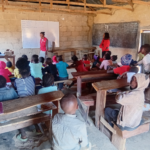As technology revolutionises the concept of work, the idea of young people working from the corner of their home and staying glued to their laptop or smartphones has become increasingly commonplace. In conservative Nigeria, however, such a lifestyle has not failed to draw suspicion. Why is this so?
This stereotype stems from internet fraud scandals, colloquially referred to as “yahoo-yahoo,” that have proliferated in recent decades. The overlap in digital spaces where both remote workers and cybercriminals operate blurs the distinction between the two. Yet this perspective is deeply flawed, undermining the hard work of remote professionals. “The vast majority of Africans involved in remote work are honest, hard-working professionals contributing immense value to the global workforce,” notes Glory Eguabor, a consultant on remote careers.
Adding to the problem is the media’s consistent neglect of positive narratives. Persistent global headlines sensationalising cases of African cybercriminals, such as Hushpuppi, compound this stigma, overshadowing the countless success stories of legitimate remote professionals. While tales of cybercrime dominate headlines, stories of African excellence in remote work rarely receive the same attention. “Stories of Africans excelling in remote work often don’t get the same attention as negative reports,” Glory notes.
Biases held by hiring managers in Western countries also play a significant role. Many associate Africa with cybersecurity risks and technological underdevelopment, reducing opportunities for African talent and perpetuating harmful stereotypes.
To dismantle this stigma, African professionals must take charge of their narrative. Success stories should not remain confined to personal networks but should be amplified widely. Whether it’s promotions, major contracts, or thriving remote careers, these achievements must be shared to reshape perceptions.
For example, Essienubong Iby, a remote professional, offers a contrasting perspective: “In my environment, I’ve never experienced such stigma. People around me understand that remote work is legitimate, and I believe this comes from proper orientation.”
Building trust with global clients is also crucial. Remote workers can enhance their reputation by prioritising cybersecurity, using secure networks and devices, and delivering consistent, high-quality results. Such professionalism doesn’t just bolster individual credibility—it elevates the collective image of African talent.
Education and advocacy are equally vital. By equipping communities with knowledge about Africa’s booming digital economy, remote workers and career coaches can help dispel misconceptions. Essienubong emphasises the transformative power of education: “Orientation matters. When people know better, they do better.” She shared that in her remote community, many individuals earn over $1,000 monthly, equivalent to millions of naira.
Strengthening cybersecurity and governance remains a long-term solution to countering the association between Africa and cybercrime. Governments and tech hubs must invest in robust infrastructure and launch awareness campaigns to protect the continent’s growing digital workforce. As Glory highlights, “Strong systems and clear policies will help counter the perception of Africa as a ‘high-risk’ region. It would boost our economy and also redeem our global image.”
The way forward lies in redefining Africa’s global narrative. By showcasing resilience, innovation and talent, Africa can position itself as a leader in the digital economy. Investments in cybersecurity expertise, the creation of trusted professional networks, and the use of blogs and podcasts to share inspiring stories are critical steps. Essienubong believes that change begins locally: “When people are exposed to the truth about remote work, they stop seeing it as suspicious. It’s about educating communities.”
Remote work is not the problem; ignorance and outdated biases are. By working together to rewrite the narrative, Africa’s digital workforce can redefine its role in the global economy. African talents should be celebrated for their invaluable contributions, not tarnished by misguided stereotypes. After all, Glory notes, “Africa is not a risk but a resource.”
The stereotype that Africans engaged in remote work are involved in internet fraud emerges from past scandals like "yahoo-yahoo," which have blurred distinctions between honest remote workers and cybercriminals. Despite this misconception, many Africans are valuable contributors to the global workforce, though their successes remain underreported compared to highlighted negative incidents related to cybercrime. This stigma is compounded by biases among Western hiring managers, who equate Africa with cybersecurity risks. To counteract this narrative, African professionals need to broadcast their success stories, build trust through enhanced cybersecurity, and deliver consistent quality work to change perceptions.
Initiatives like adequate orientation, community education, and advocacy are pivotal in fighting misinformation and bolstering Africa’s image in the digital space. Governments and tech hubs must invest in cybersecurity and strong policies to protect and promote Africa's digital workforce. By redefining Africa's global narrative with evidence of resilience, innovation, and talent, the continent can position itself as a leader in the digital economy. Dispelling old biases will shine a light on Africa as a resourceful contributor to the global stage, not a risk, as highlighted by African talents like Glory Eguabor.






